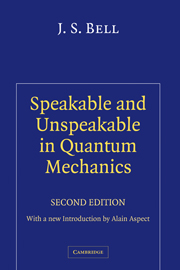Book contents
- Frontmatter
- Contents
- List of papers on quantum philosophy by J. S. Bell
- Preface to the first edition
- Acknowledgements
- Introduction: John Bell and the second quantum revolution
- 1 On the problem of hidden variables in quantum mechanics
- 2 On the Einstein–Podolsky–Rosen paradox
- 3 The moral aspect of quantum mechanics
- 4 Introduction to the hidden-variable question
- 5 Subject and object
- 6 On wave packet reduction in the Coleman–Hepp model
- 7 The theory of local beables
- 8 Locality in quantum mechanics: reply to critics
- 9 How to teach special relativity
- 10 Einstein–Podolsky–Rosen experiments
- 11 The measurement theory of Everett and de Broglie's pilot wave
- 12 Free variables and local causality
- 13 Atomic-cascade photons and quantum-mechanical nonlocality
- 14 de Broglie–Bohm, delayed-choice double-slit experiment, and density matrix
- 15 Quantum mechanics for cosmologists
- 16 Bertlmann's socks and the nature of reality
- 17 On the impossible pilot wave
- 18 Speakable and unspeakable in quantum mechanics
- 19 Beables for quantum field theory
- 20 Six possible worlds of quantum mechanics
- 21 EPR correlations and EPW distributions
- 22 Are there quantum jumps?
- 23 Against ‘measurement’
- 24 La nouvelle cuisine
7 - The theory of local beables
Published online by Cambridge University Press: 11 April 2011
- Frontmatter
- Contents
- List of papers on quantum philosophy by J. S. Bell
- Preface to the first edition
- Acknowledgements
- Introduction: John Bell and the second quantum revolution
- 1 On the problem of hidden variables in quantum mechanics
- 2 On the Einstein–Podolsky–Rosen paradox
- 3 The moral aspect of quantum mechanics
- 4 Introduction to the hidden-variable question
- 5 Subject and object
- 6 On wave packet reduction in the Coleman–Hepp model
- 7 The theory of local beables
- 8 Locality in quantum mechanics: reply to critics
- 9 How to teach special relativity
- 10 Einstein–Podolsky–Rosen experiments
- 11 The measurement theory of Everett and de Broglie's pilot wave
- 12 Free variables and local causality
- 13 Atomic-cascade photons and quantum-mechanical nonlocality
- 14 de Broglie–Bohm, delayed-choice double-slit experiment, and density matrix
- 15 Quantum mechanics for cosmologists
- 16 Bertlmann's socks and the nature of reality
- 17 On the impossible pilot wave
- 18 Speakable and unspeakable in quantum mechanics
- 19 Beables for quantum field theory
- 20 Six possible worlds of quantum mechanics
- 21 EPR correlations and EPW distributions
- 22 Are there quantum jumps?
- 23 Against ‘measurement’
- 24 La nouvelle cuisine
Summary
Introduction: the theory of local beables
This is a pretentious name for a theory which hardly exists otherwise, but which ought to exist. The name is deliberately modelled on ‘the algebra of local observables’. The terminology, be-able as against observ-able, is not designed to frighten with metaphysic those dedicated to realphysic. It is chosen rather to help in making explicit some notions already implicit in, and basic to, ordinary quantum theory. For, in the words of Bohr, ‘it is decisive to recognize that, however far the phenomena transcend the scope of classical physical explanation, the account of all evidence must be expressed in classical terms’. It is the ambition of the theory of local beables to bring these ‘classical terms’ into the equations, and not relegate them entirely to the surrounding talk.
The concept of ‘observable’ lends itself to very precise mathematics when identified with ‘self-adjoint operator’. But physically, it is a rather woolly concept. It is not easy to identify precisely which physical processes are to be given the status of ‘observations’ and which are to be relegated to the limbo between one observation and another. So it could be hoped that some increase in precision might be possible by concentration on the beables, which can be described in ‘classical terms’, because they are there. The beables must include the settings of switches and knobs on experimental equipment, the currents in coils, and the readings of instruments. ‘Observables’ must be made, somehow, out of beables.
Information
- Type
- Chapter
- Information
- Speakable and Unspeakable in Quantum MechanicsCollected Papers on Quantum Philosophy, pp. 52 - 62Publisher: Cambridge University PressPrint publication year: 2004
Accessibility standard: Unknown
Why this information is here
This section outlines the accessibility features of this content - including support for screen readers, full keyboard navigation and high-contrast display options. This may not be relevant for you.Accessibility Information
- 50
- Cited by
